ZAARA Unit 7: Comprehensive Analysis of the English Legal System
VerifiedAdded on 2024/05/17
|21
|5333
|329
Report
AI Summary
This report provides an in-depth analysis of the English legal system, covering its sources, constitution, governance, and legislative processes. It examines the application of international law, the court structure and hierarchy, and the roles of specialist courts and quasi-legal authorities. The report also discusses reforms in the legal system, including the impact of digital technology, and explores key areas of law such as company law, employment law, and contract law. It further addresses emergency powers, human rights protection, and the amendment process of the constitution. A comparison is made between the English and Chinese legal systems, highlighting their differences in common law application and the principle of stare decisis. The report uses Gilpin Hotel & Lake House as a case study to illustrate the practical implications of the legal system on organizations.
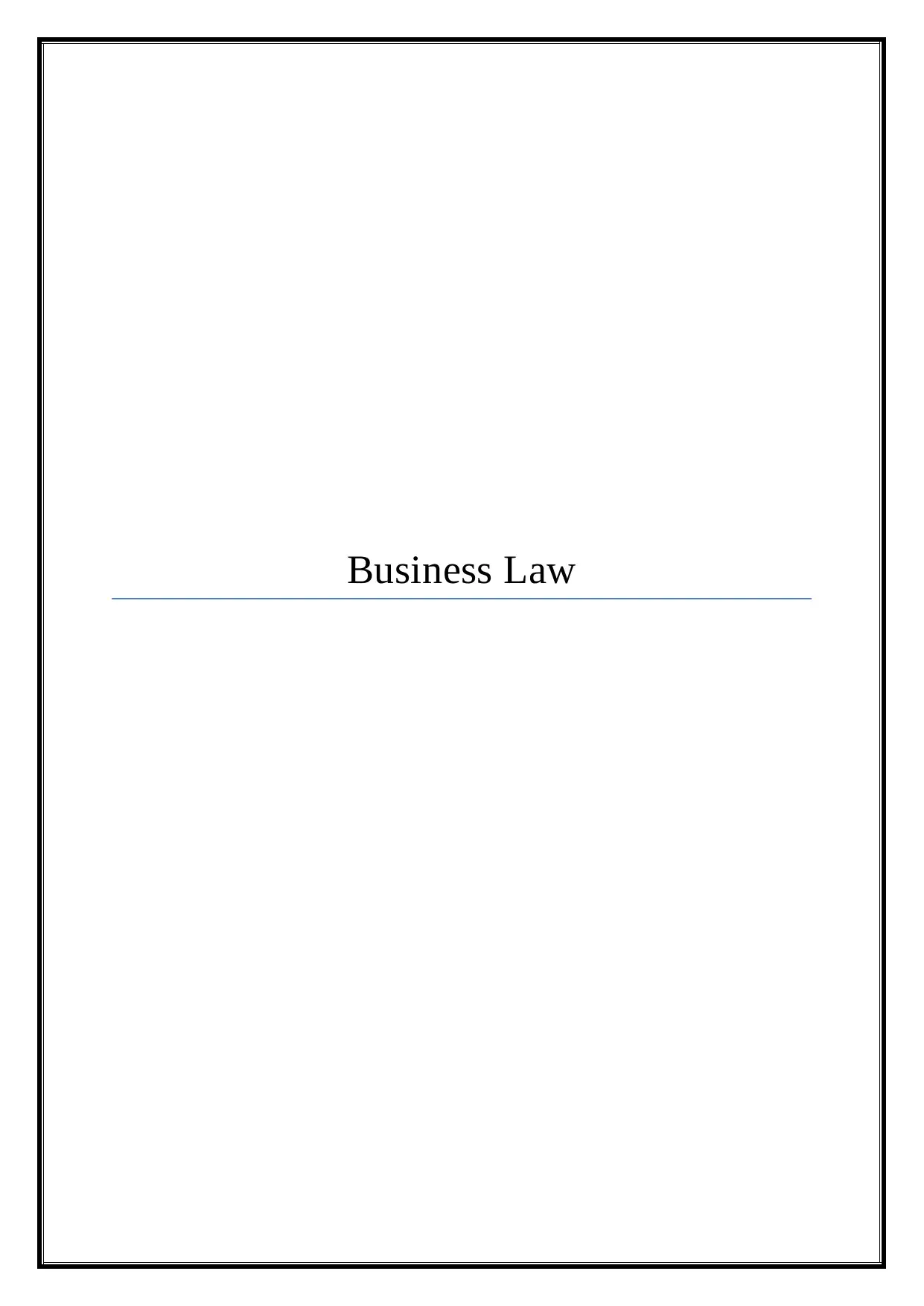
Business Law
Paraphrase This Document
Need a fresh take? Get an instant paraphrase of this document with our AI Paraphraser
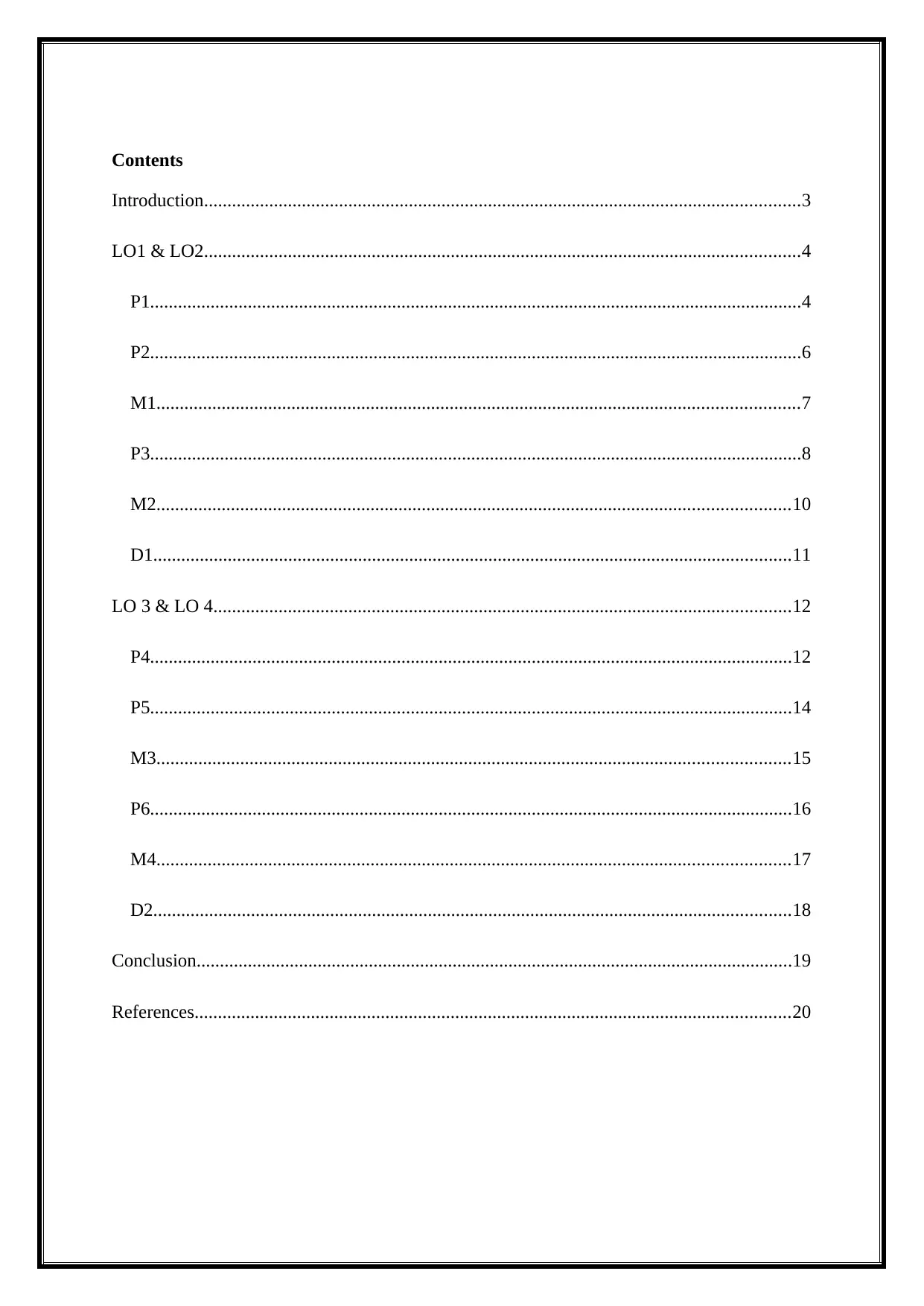
Contents
Introduction................................................................................................................................3
LO1 & LO2................................................................................................................................4
P1............................................................................................................................................4
P2............................................................................................................................................6
M1..........................................................................................................................................7
P3............................................................................................................................................8
M2........................................................................................................................................10
D1.........................................................................................................................................11
LO 3 & LO 4............................................................................................................................12
P4..........................................................................................................................................12
P5..........................................................................................................................................14
M3........................................................................................................................................15
P6..........................................................................................................................................16
M4........................................................................................................................................17
D2.........................................................................................................................................18
Conclusion................................................................................................................................19
References................................................................................................................................20
Introduction................................................................................................................................3
LO1 & LO2................................................................................................................................4
P1............................................................................................................................................4
P2............................................................................................................................................6
M1..........................................................................................................................................7
P3............................................................................................................................................8
M2........................................................................................................................................10
D1.........................................................................................................................................11
LO 3 & LO 4............................................................................................................................12
P4..........................................................................................................................................12
P5..........................................................................................................................................14
M3........................................................................................................................................15
P6..........................................................................................................................................16
M4........................................................................................................................................17
D2.........................................................................................................................................18
Conclusion................................................................................................................................19
References................................................................................................................................20
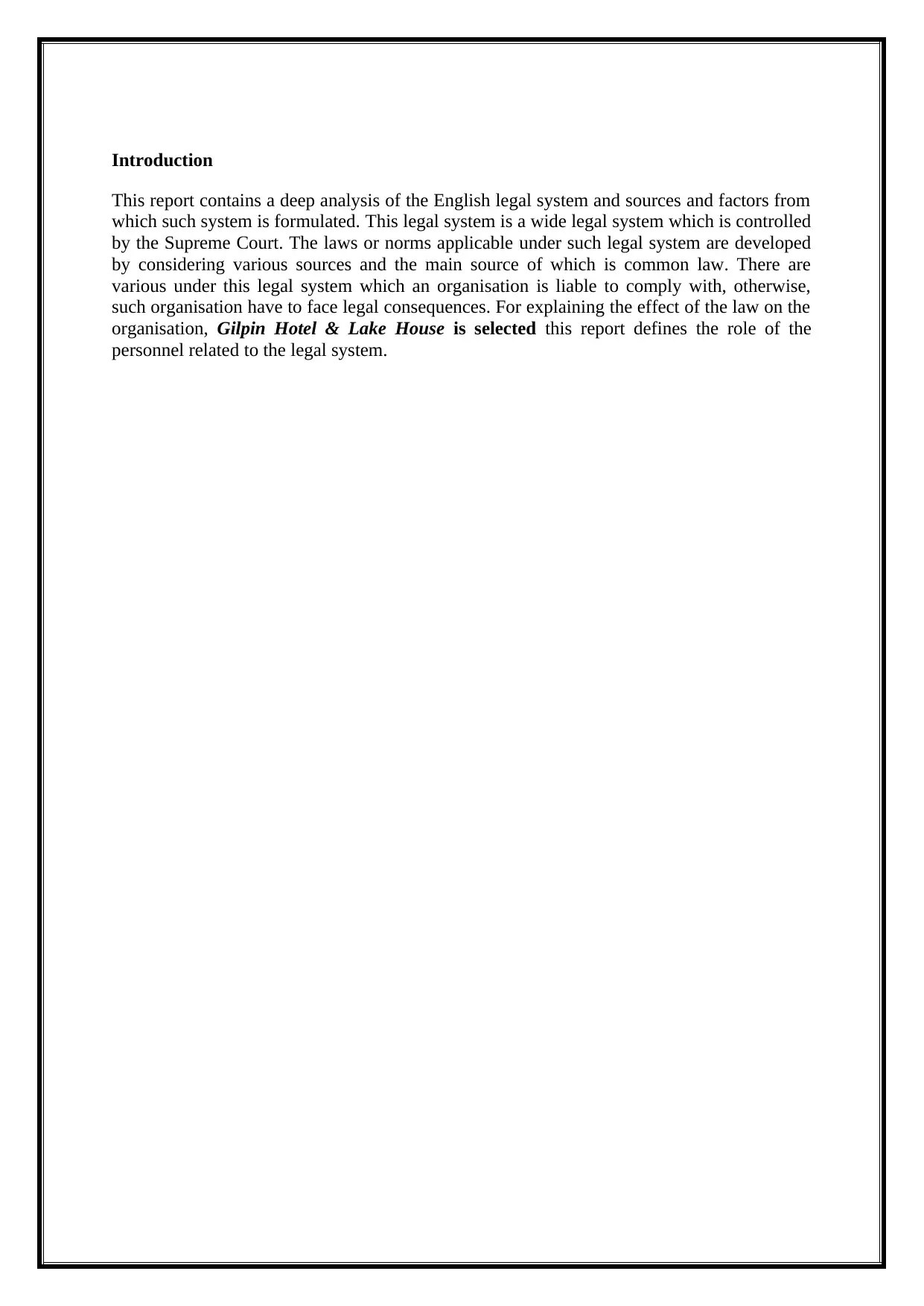
Introduction
This report contains a deep analysis of the English legal system and sources and factors from
which such system is formulated. This legal system is a wide legal system which is controlled
by the Supreme Court. The laws or norms applicable under such legal system are developed
by considering various sources and the main source of which is common law. There are
various under this legal system which an organisation is liable to comply with, otherwise,
such organisation have to face legal consequences. For explaining the effect of the law on the
organisation, Gilpin Hotel & Lake House is selected this report defines the role of the
personnel related to the legal system.
This report contains a deep analysis of the English legal system and sources and factors from
which such system is formulated. This legal system is a wide legal system which is controlled
by the Supreme Court. The laws or norms applicable under such legal system are developed
by considering various sources and the main source of which is common law. There are
various under this legal system which an organisation is liable to comply with, otherwise,
such organisation have to face legal consequences. For explaining the effect of the law on the
organisation, Gilpin Hotel & Lake House is selected this report defines the role of the
personnel related to the legal system.
⊘ This is a preview!⊘
Do you want full access?
Subscribe today to unlock all pages.

Trusted by 1+ million students worldwide
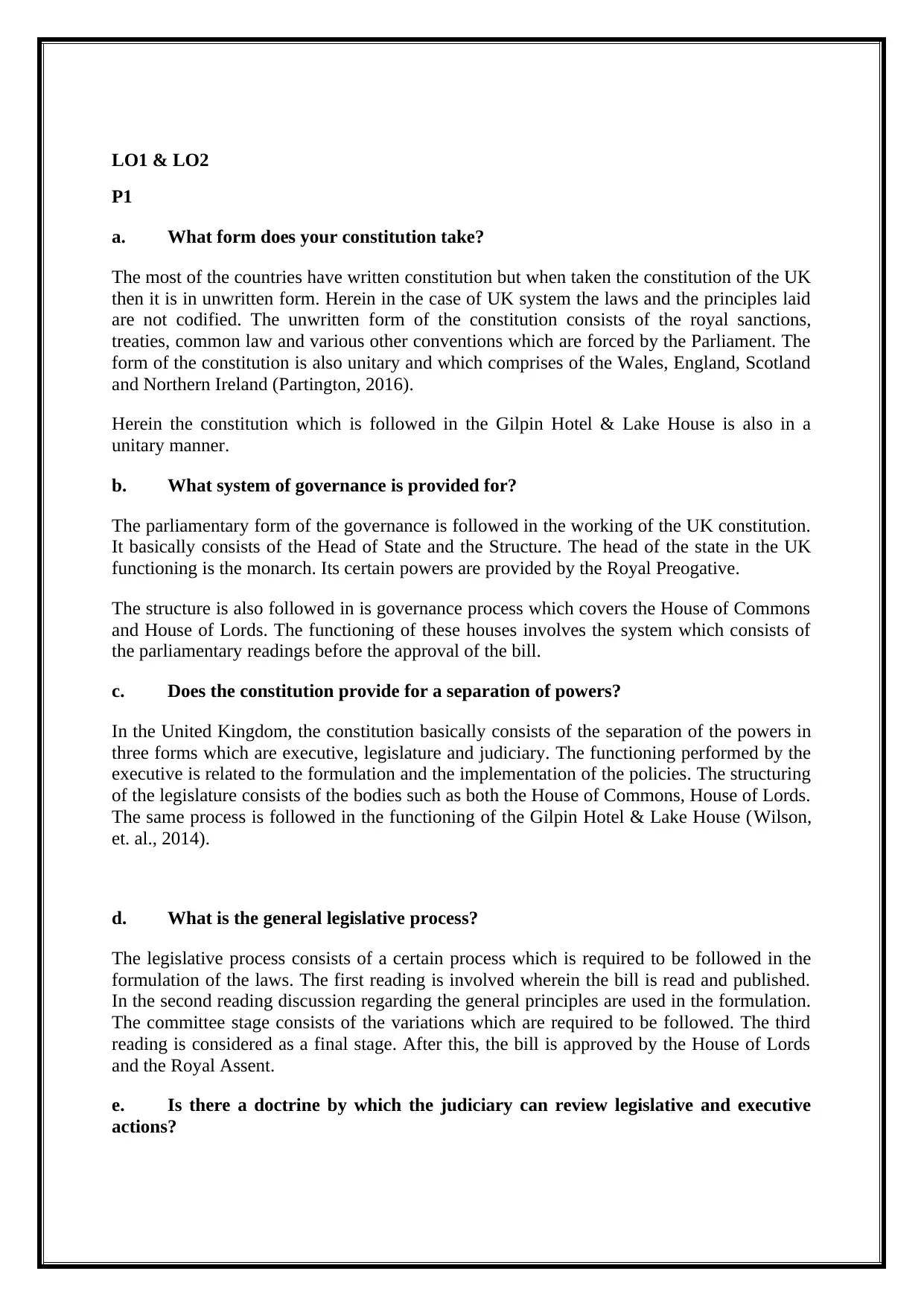
LO1 & LO2
P1
a. What form does your constitution take?
The most of the countries have written constitution but when taken the constitution of the UK
then it is in unwritten form. Herein in the case of UK system the laws and the principles laid
are not codified. The unwritten form of the constitution consists of the royal sanctions,
treaties, common law and various other conventions which are forced by the Parliament. The
form of the constitution is also unitary and which comprises of the Wales, England, Scotland
and Northern Ireland (Partington, 2016).
Herein the constitution which is followed in the Gilpin Hotel & Lake House is also in a
unitary manner.
b. What system of governance is provided for?
The parliamentary form of the governance is followed in the working of the UK constitution.
It basically consists of the Head of State and the Structure. The head of the state in the UK
functioning is the monarch. Its certain powers are provided by the Royal Preogative.
The structure is also followed in is governance process which covers the House of Commons
and House of Lords. The functioning of these houses involves the system which consists of
the parliamentary readings before the approval of the bill.
c. Does the constitution provide for a separation of powers?
In the United Kingdom, the constitution basically consists of the separation of the powers in
three forms which are executive, legislature and judiciary. The functioning performed by the
executive is related to the formulation and the implementation of the policies. The structuring
of the legislature consists of the bodies such as both the House of Commons, House of Lords.
The same process is followed in the functioning of the Gilpin Hotel & Lake House (Wilson,
et. al., 2014).
d. What is the general legislative process?
The legislative process consists of a certain process which is required to be followed in the
formulation of the laws. The first reading is involved wherein the bill is read and published.
In the second reading discussion regarding the general principles are used in the formulation.
The committee stage consists of the variations which are required to be followed. The third
reading is considered as a final stage. After this, the bill is approved by the House of Lords
and the Royal Assent.
e. Is there a doctrine by which the judiciary can review legislative and executive
actions?
P1
a. What form does your constitution take?
The most of the countries have written constitution but when taken the constitution of the UK
then it is in unwritten form. Herein in the case of UK system the laws and the principles laid
are not codified. The unwritten form of the constitution consists of the royal sanctions,
treaties, common law and various other conventions which are forced by the Parliament. The
form of the constitution is also unitary and which comprises of the Wales, England, Scotland
and Northern Ireland (Partington, 2016).
Herein the constitution which is followed in the Gilpin Hotel & Lake House is also in a
unitary manner.
b. What system of governance is provided for?
The parliamentary form of the governance is followed in the working of the UK constitution.
It basically consists of the Head of State and the Structure. The head of the state in the UK
functioning is the monarch. Its certain powers are provided by the Royal Preogative.
The structure is also followed in is governance process which covers the House of Commons
and House of Lords. The functioning of these houses involves the system which consists of
the parliamentary readings before the approval of the bill.
c. Does the constitution provide for a separation of powers?
In the United Kingdom, the constitution basically consists of the separation of the powers in
three forms which are executive, legislature and judiciary. The functioning performed by the
executive is related to the formulation and the implementation of the policies. The structuring
of the legislature consists of the bodies such as both the House of Commons, House of Lords.
The same process is followed in the functioning of the Gilpin Hotel & Lake House (Wilson,
et. al., 2014).
d. What is the general legislative process?
The legislative process consists of a certain process which is required to be followed in the
formulation of the laws. The first reading is involved wherein the bill is read and published.
In the second reading discussion regarding the general principles are used in the formulation.
The committee stage consists of the variations which are required to be followed. The third
reading is considered as a final stage. After this, the bill is approved by the House of Lords
and the Royal Assent.
e. Is there a doctrine by which the judiciary can review legislative and executive
actions?
Paraphrase This Document
Need a fresh take? Get an instant paraphrase of this document with our AI Paraphraser
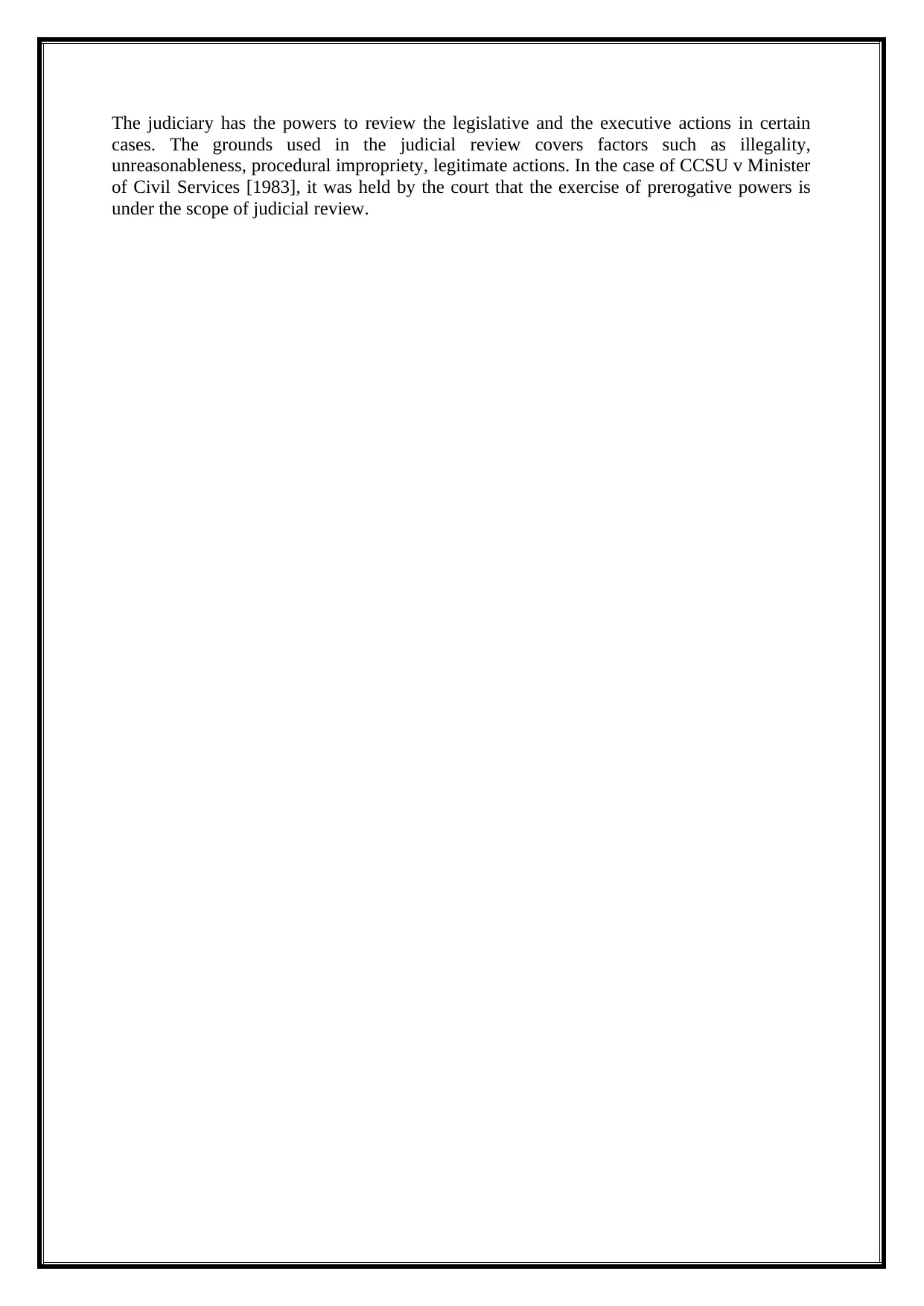
The judiciary has the powers to review the legislative and the executive actions in certain
cases. The grounds used in the judicial review covers factors such as illegality,
unreasonableness, procedural impropriety, legitimate actions. In the case of CCSU v Minister
of Civil Services [1983], it was held by the court that the exercise of prerogative powers is
under the scope of judicial review.
cases. The grounds used in the judicial review covers factors such as illegality,
unreasonableness, procedural impropriety, legitimate actions. In the case of CCSU v Minister
of Civil Services [1983], it was held by the court that the exercise of prerogative powers is
under the scope of judicial review.
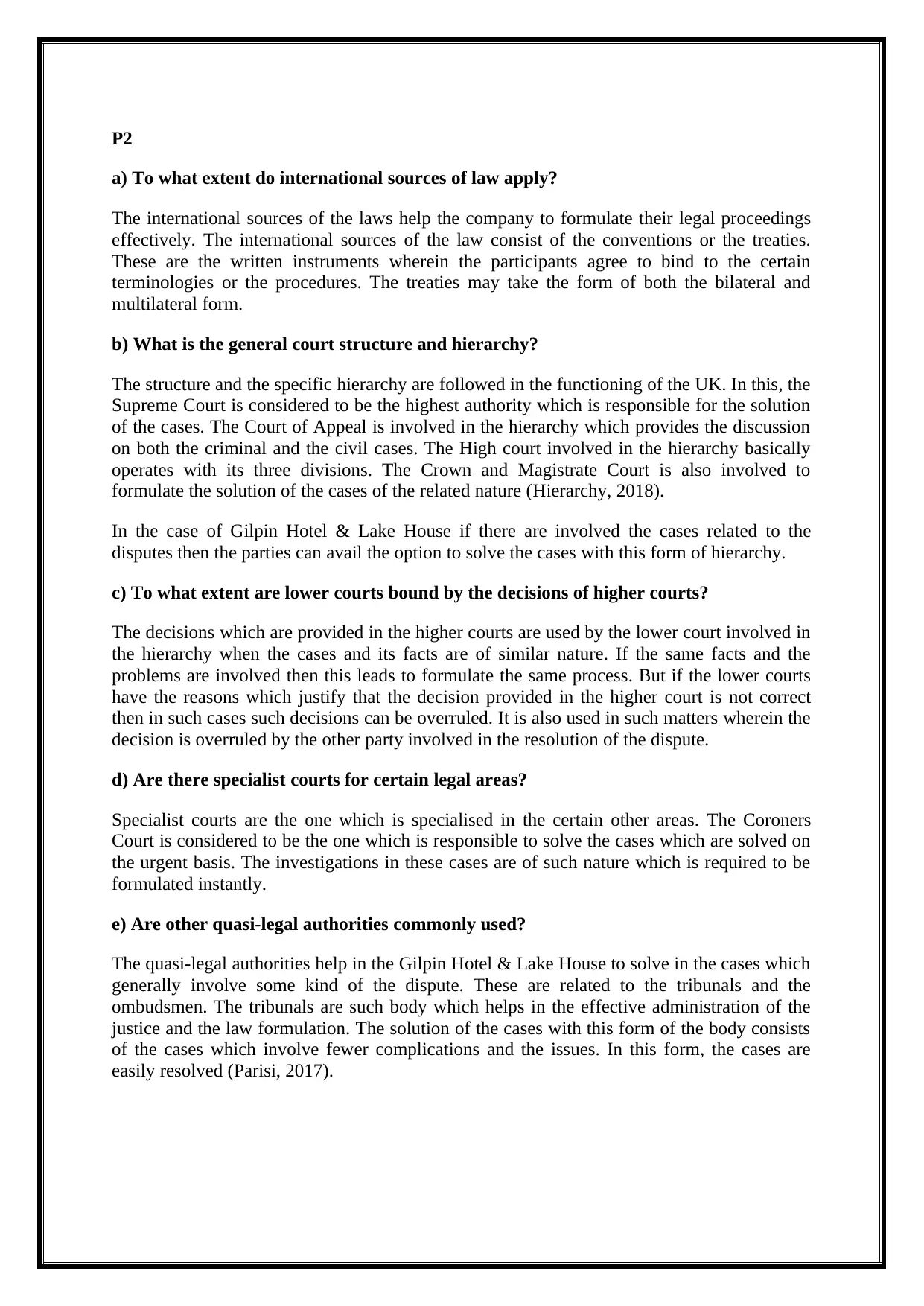
P2
a) To what extent do international sources of law apply?
The international sources of the laws help the company to formulate their legal proceedings
effectively. The international sources of the law consist of the conventions or the treaties.
These are the written instruments wherein the participants agree to bind to the certain
terminologies or the procedures. The treaties may take the form of both the bilateral and
multilateral form.
b) What is the general court structure and hierarchy?
The structure and the specific hierarchy are followed in the functioning of the UK. In this, the
Supreme Court is considered to be the highest authority which is responsible for the solution
of the cases. The Court of Appeal is involved in the hierarchy which provides the discussion
on both the criminal and the civil cases. The High court involved in the hierarchy basically
operates with its three divisions. The Crown and Magistrate Court is also involved to
formulate the solution of the cases of the related nature (Hierarchy, 2018).
In the case of Gilpin Hotel & Lake House if there are involved the cases related to the
disputes then the parties can avail the option to solve the cases with this form of hierarchy.
c) To what extent are lower courts bound by the decisions of higher courts?
The decisions which are provided in the higher courts are used by the lower court involved in
the hierarchy when the cases and its facts are of similar nature. If the same facts and the
problems are involved then this leads to formulate the same process. But if the lower courts
have the reasons which justify that the decision provided in the higher court is not correct
then in such cases such decisions can be overruled. It is also used in such matters wherein the
decision is overruled by the other party involved in the resolution of the dispute.
d) Are there specialist courts for certain legal areas?
Specialist courts are the one which is specialised in the certain other areas. The Coroners
Court is considered to be the one which is responsible to solve the cases which are solved on
the urgent basis. The investigations in these cases are of such nature which is required to be
formulated instantly.
e) Are other quasi-legal authorities commonly used?
The quasi-legal authorities help in the Gilpin Hotel & Lake House to solve in the cases which
generally involve some kind of the dispute. These are related to the tribunals and the
ombudsmen. The tribunals are such body which helps in the effective administration of the
justice and the law formulation. The solution of the cases with this form of the body consists
of the cases which involve fewer complications and the issues. In this form, the cases are
easily resolved (Parisi, 2017).
a) To what extent do international sources of law apply?
The international sources of the laws help the company to formulate their legal proceedings
effectively. The international sources of the law consist of the conventions or the treaties.
These are the written instruments wherein the participants agree to bind to the certain
terminologies or the procedures. The treaties may take the form of both the bilateral and
multilateral form.
b) What is the general court structure and hierarchy?
The structure and the specific hierarchy are followed in the functioning of the UK. In this, the
Supreme Court is considered to be the highest authority which is responsible for the solution
of the cases. The Court of Appeal is involved in the hierarchy which provides the discussion
on both the criminal and the civil cases. The High court involved in the hierarchy basically
operates with its three divisions. The Crown and Magistrate Court is also involved to
formulate the solution of the cases of the related nature (Hierarchy, 2018).
In the case of Gilpin Hotel & Lake House if there are involved the cases related to the
disputes then the parties can avail the option to solve the cases with this form of hierarchy.
c) To what extent are lower courts bound by the decisions of higher courts?
The decisions which are provided in the higher courts are used by the lower court involved in
the hierarchy when the cases and its facts are of similar nature. If the same facts and the
problems are involved then this leads to formulate the same process. But if the lower courts
have the reasons which justify that the decision provided in the higher court is not correct
then in such cases such decisions can be overruled. It is also used in such matters wherein the
decision is overruled by the other party involved in the resolution of the dispute.
d) Are there specialist courts for certain legal areas?
Specialist courts are the one which is specialised in the certain other areas. The Coroners
Court is considered to be the one which is responsible to solve the cases which are solved on
the urgent basis. The investigations in these cases are of such nature which is required to be
formulated instantly.
e) Are other quasi-legal authorities commonly used?
The quasi-legal authorities help in the Gilpin Hotel & Lake House to solve in the cases which
generally involve some kind of the dispute. These are related to the tribunals and the
ombudsmen. The tribunals are such body which helps in the effective administration of the
justice and the law formulation. The solution of the cases with this form of the body consists
of the cases which involve fewer complications and the issues. In this form, the cases are
easily resolved (Parisi, 2017).
⊘ This is a preview!⊘
Do you want full access?
Subscribe today to unlock all pages.

Trusted by 1+ million students worldwide
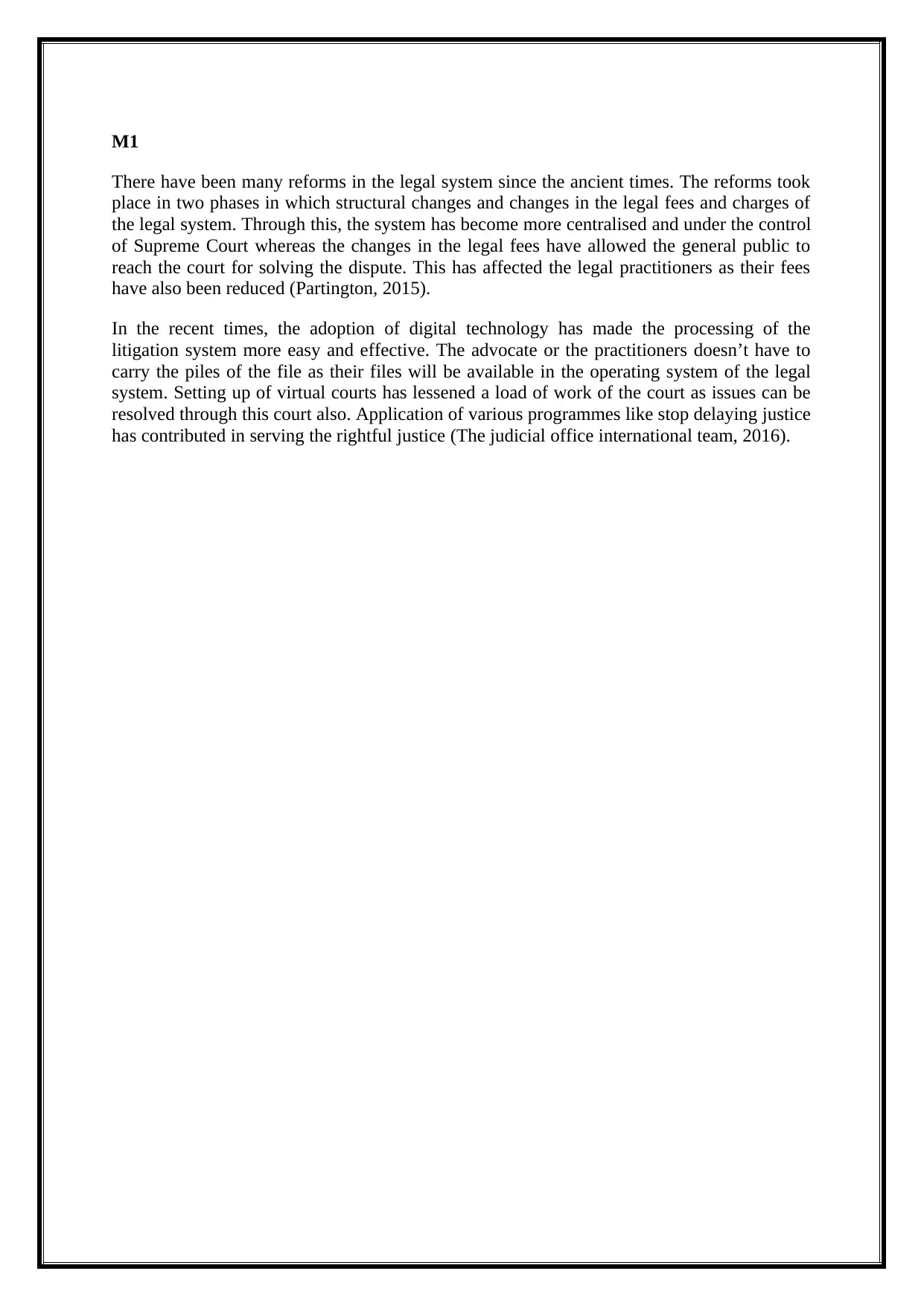
M1
There have been many reforms in the legal system since the ancient times. The reforms took
place in two phases in which structural changes and changes in the legal fees and charges of
the legal system. Through this, the system has become more centralised and under the control
of Supreme Court whereas the changes in the legal fees have allowed the general public to
reach the court for solving the dispute. This has affected the legal practitioners as their fees
have also been reduced (Partington, 2015).
In the recent times, the adoption of digital technology has made the processing of the
litigation system more easy and effective. The advocate or the practitioners doesn’t have to
carry the piles of the file as their files will be available in the operating system of the legal
system. Setting up of virtual courts has lessened a load of work of the court as issues can be
resolved through this court also. Application of various programmes like stop delaying justice
has contributed in serving the rightful justice (The judicial office international team, 2016).
There have been many reforms in the legal system since the ancient times. The reforms took
place in two phases in which structural changes and changes in the legal fees and charges of
the legal system. Through this, the system has become more centralised and under the control
of Supreme Court whereas the changes in the legal fees have allowed the general public to
reach the court for solving the dispute. This has affected the legal practitioners as their fees
have also been reduced (Partington, 2015).
In the recent times, the adoption of digital technology has made the processing of the
litigation system more easy and effective. The advocate or the practitioners doesn’t have to
carry the piles of the file as their files will be available in the operating system of the legal
system. Setting up of virtual courts has lessened a load of work of the court as issues can be
resolved through this court also. Application of various programmes like stop delaying justice
has contributed in serving the rightful justice (The judicial office international team, 2016).
Paraphrase This Document
Need a fresh take? Get an instant paraphrase of this document with our AI Paraphraser
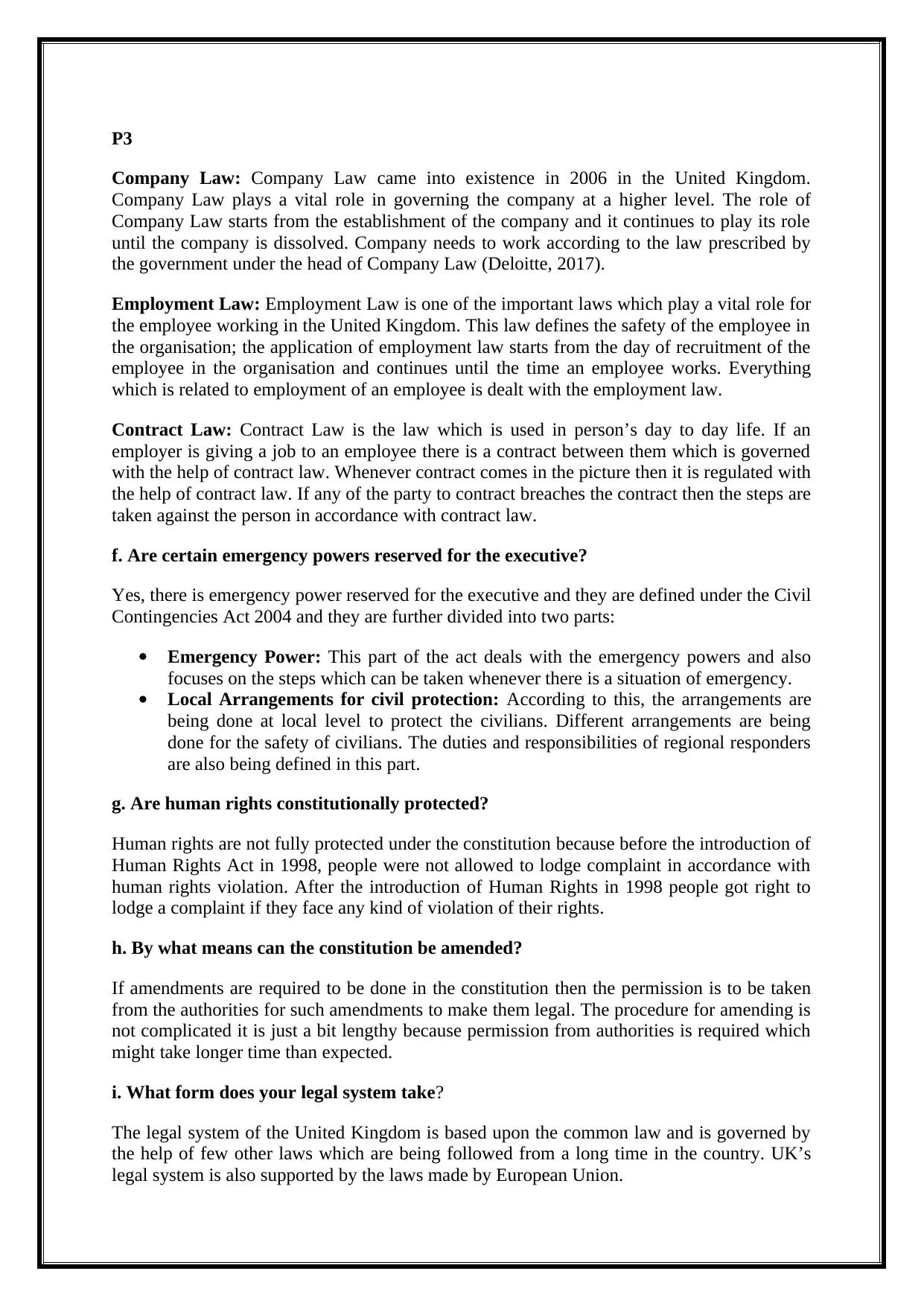
P3
Company Law: Company Law came into existence in 2006 in the United Kingdom.
Company Law plays a vital role in governing the company at a higher level. The role of
Company Law starts from the establishment of the company and it continues to play its role
until the company is dissolved. Company needs to work according to the law prescribed by
the government under the head of Company Law (Deloitte, 2017).
Employment Law: Employment Law is one of the important laws which play a vital role for
the employee working in the United Kingdom. This law defines the safety of the employee in
the organisation; the application of employment law starts from the day of recruitment of the
employee in the organisation and continues until the time an employee works. Everything
which is related to employment of an employee is dealt with the employment law.
Contract Law: Contract Law is the law which is used in person’s day to day life. If an
employer is giving a job to an employee there is a contract between them which is governed
with the help of contract law. Whenever contract comes in the picture then it is regulated with
the help of contract law. If any of the party to contract breaches the contract then the steps are
taken against the person in accordance with contract law.
f. Are certain emergency powers reserved for the executive?
Yes, there is emergency power reserved for the executive and they are defined under the Civil
Contingencies Act 2004 and they are further divided into two parts:
Emergency Power: This part of the act deals with the emergency powers and also
focuses on the steps which can be taken whenever there is a situation of emergency.
Local Arrangements for civil protection: According to this, the arrangements are
being done at local level to protect the civilians. Different arrangements are being
done for the safety of civilians. The duties and responsibilities of regional responders
are also being defined in this part.
g. Are human rights constitutionally protected?
Human rights are not fully protected under the constitution because before the introduction of
Human Rights Act in 1998, people were not allowed to lodge complaint in accordance with
human rights violation. After the introduction of Human Rights in 1998 people got right to
lodge a complaint if they face any kind of violation of their rights.
h. By what means can the constitution be amended?
If amendments are required to be done in the constitution then the permission is to be taken
from the authorities for such amendments to make them legal. The procedure for amending is
not complicated it is just a bit lengthy because permission from authorities is required which
might take longer time than expected.
i. What form does your legal system take?
The legal system of the United Kingdom is based upon the common law and is governed by
the help of few other laws which are being followed from a long time in the country. UK’s
legal system is also supported by the laws made by European Union.
Company Law: Company Law came into existence in 2006 in the United Kingdom.
Company Law plays a vital role in governing the company at a higher level. The role of
Company Law starts from the establishment of the company and it continues to play its role
until the company is dissolved. Company needs to work according to the law prescribed by
the government under the head of Company Law (Deloitte, 2017).
Employment Law: Employment Law is one of the important laws which play a vital role for
the employee working in the United Kingdom. This law defines the safety of the employee in
the organisation; the application of employment law starts from the day of recruitment of the
employee in the organisation and continues until the time an employee works. Everything
which is related to employment of an employee is dealt with the employment law.
Contract Law: Contract Law is the law which is used in person’s day to day life. If an
employer is giving a job to an employee there is a contract between them which is governed
with the help of contract law. Whenever contract comes in the picture then it is regulated with
the help of contract law. If any of the party to contract breaches the contract then the steps are
taken against the person in accordance with contract law.
f. Are certain emergency powers reserved for the executive?
Yes, there is emergency power reserved for the executive and they are defined under the Civil
Contingencies Act 2004 and they are further divided into two parts:
Emergency Power: This part of the act deals with the emergency powers and also
focuses on the steps which can be taken whenever there is a situation of emergency.
Local Arrangements for civil protection: According to this, the arrangements are
being done at local level to protect the civilians. Different arrangements are being
done for the safety of civilians. The duties and responsibilities of regional responders
are also being defined in this part.
g. Are human rights constitutionally protected?
Human rights are not fully protected under the constitution because before the introduction of
Human Rights Act in 1998, people were not allowed to lodge complaint in accordance with
human rights violation. After the introduction of Human Rights in 1998 people got right to
lodge a complaint if they face any kind of violation of their rights.
h. By what means can the constitution be amended?
If amendments are required to be done in the constitution then the permission is to be taken
from the authorities for such amendments to make them legal. The procedure for amending is
not complicated it is just a bit lengthy because permission from authorities is required which
might take longer time than expected.
i. What form does your legal system take?
The legal system of the United Kingdom is based upon the common law and is governed by
the help of few other laws which are being followed from a long time in the country. UK’s
legal system is also supported by the laws made by European Union.
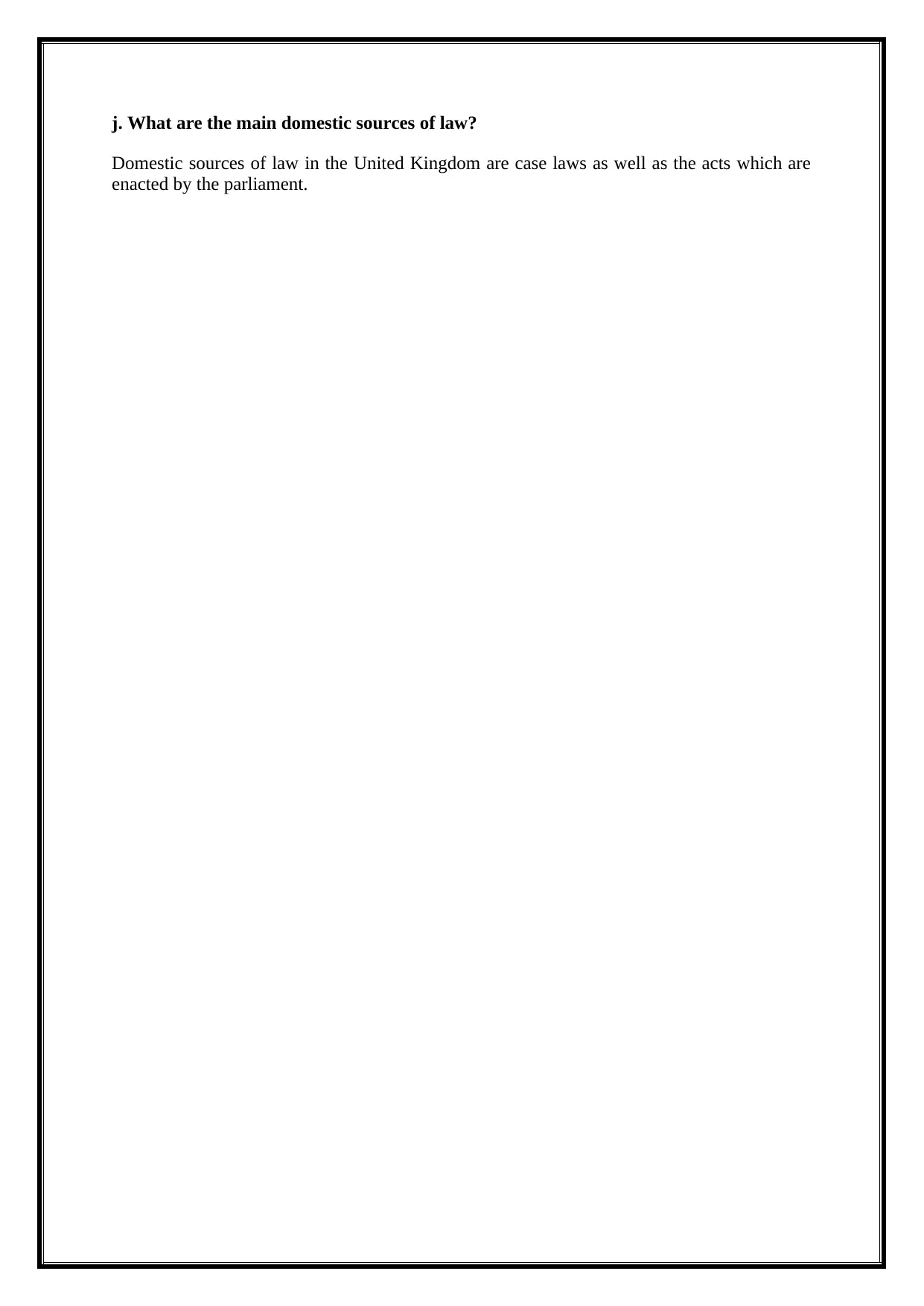
j. What are the main domestic sources of law?
Domestic sources of law in the United Kingdom are case laws as well as the acts which are
enacted by the parliament.
Domestic sources of law in the United Kingdom are case laws as well as the acts which are
enacted by the parliament.
⊘ This is a preview!⊘
Do you want full access?
Subscribe today to unlock all pages.

Trusted by 1+ million students worldwide
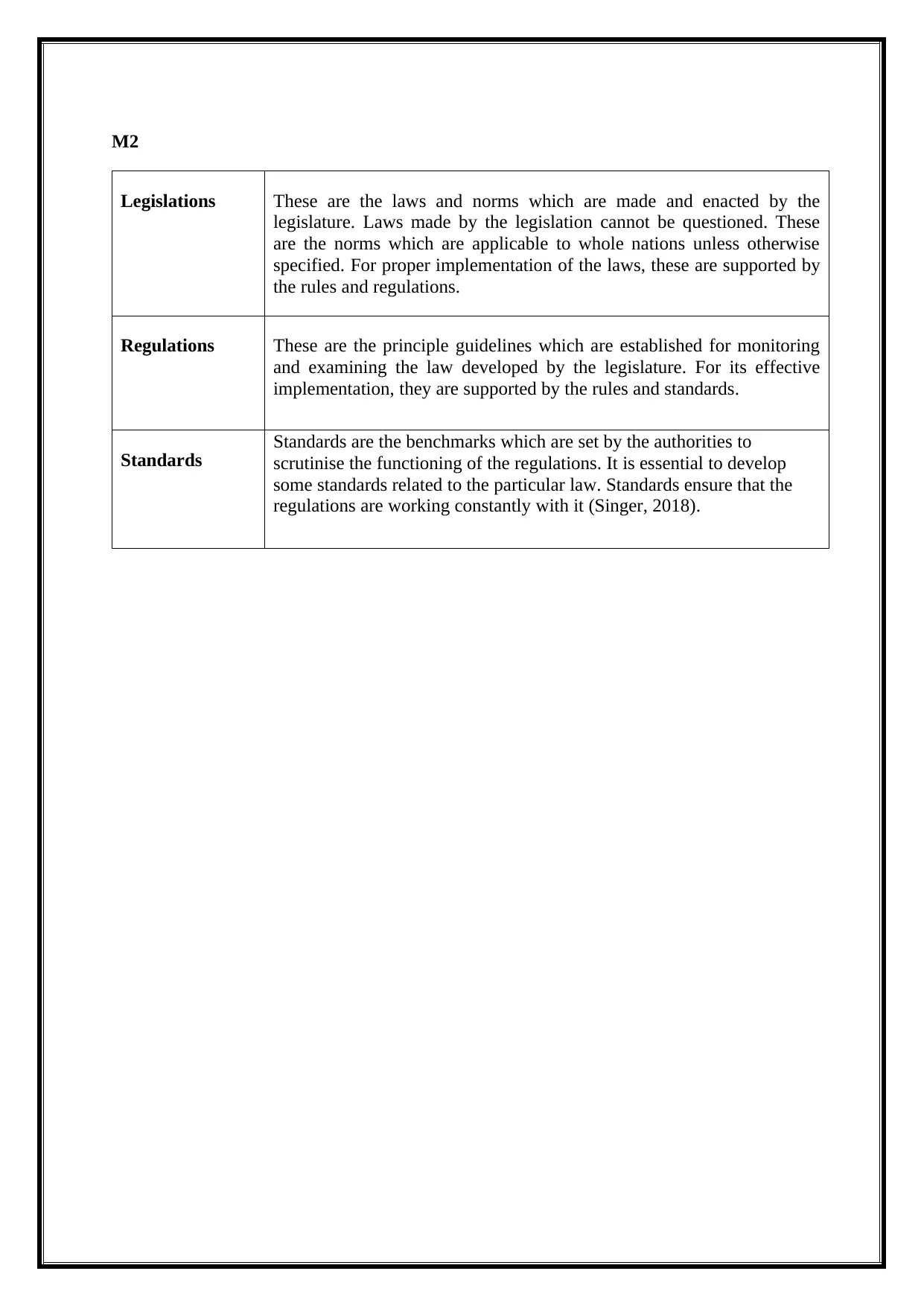
M2
Legislations These are the laws and norms which are made and enacted by the
legislature. Laws made by the legislation cannot be questioned. These
are the norms which are applicable to whole nations unless otherwise
specified. For proper implementation of the laws, these are supported by
the rules and regulations.
Regulations These are the principle guidelines which are established for monitoring
and examining the law developed by the legislature. For its effective
implementation, they are supported by the rules and standards.
Standards Standards are the benchmarks which are set by the authorities to
scrutinise the functioning of the regulations. It is essential to develop
some standards related to the particular law. Standards ensure that the
regulations are working constantly with it (Singer, 2018).
Legislations These are the laws and norms which are made and enacted by the
legislature. Laws made by the legislation cannot be questioned. These
are the norms which are applicable to whole nations unless otherwise
specified. For proper implementation of the laws, these are supported by
the rules and regulations.
Regulations These are the principle guidelines which are established for monitoring
and examining the law developed by the legislature. For its effective
implementation, they are supported by the rules and standards.
Standards Standards are the benchmarks which are set by the authorities to
scrutinise the functioning of the regulations. It is essential to develop
some standards related to the particular law. Standards ensure that the
regulations are working constantly with it (Singer, 2018).
Paraphrase This Document
Need a fresh take? Get an instant paraphrase of this document with our AI Paraphraser
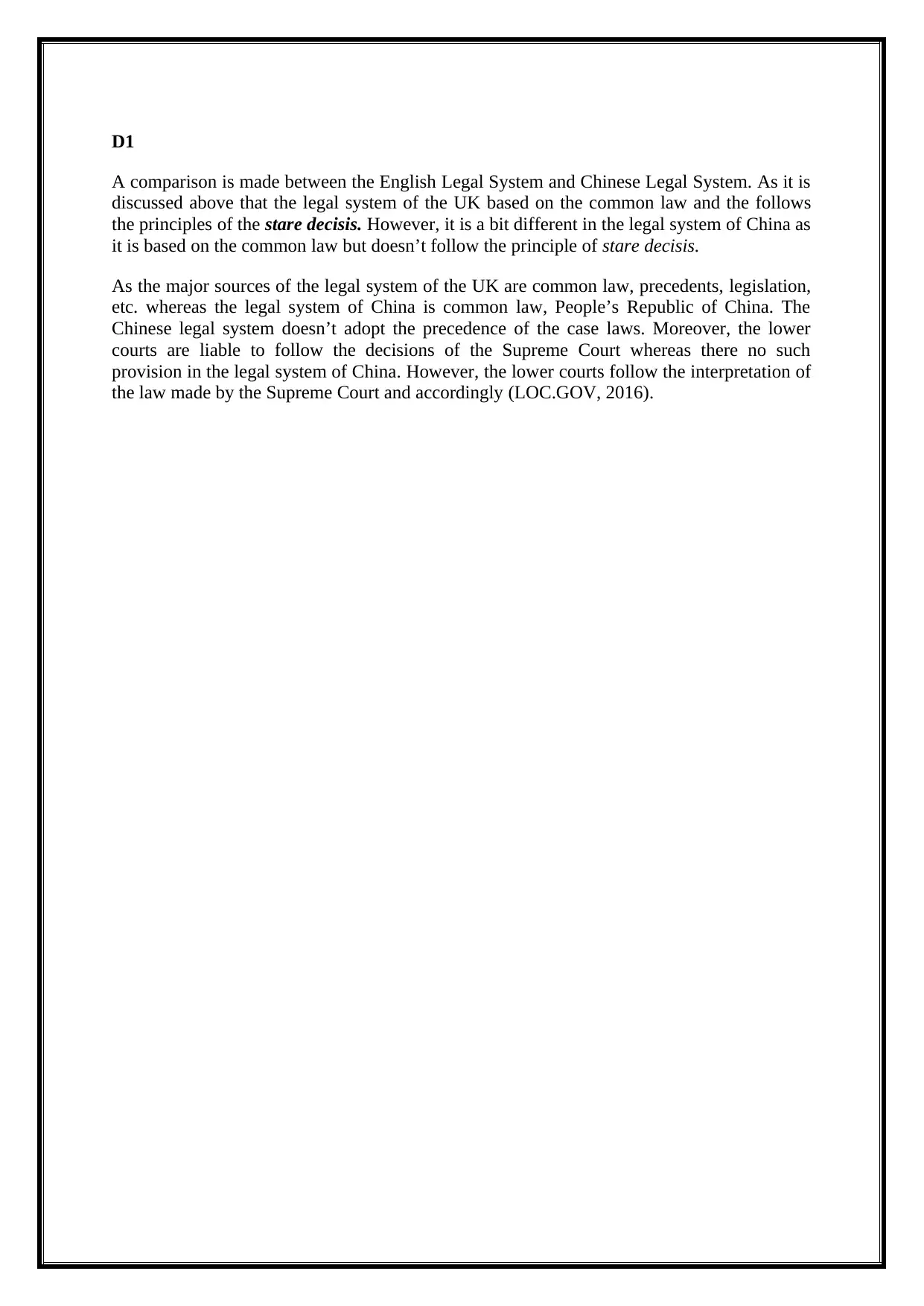
D1
A comparison is made between the English Legal System and Chinese Legal System. As it is
discussed above that the legal system of the UK based on the common law and the follows
the principles of the stare decisis. However, it is a bit different in the legal system of China as
it is based on the common law but doesn’t follow the principle of stare decisis.
As the major sources of the legal system of the UK are common law, precedents, legislation,
etc. whereas the legal system of China is common law, People’s Republic of China. The
Chinese legal system doesn’t adopt the precedence of the case laws. Moreover, the lower
courts are liable to follow the decisions of the Supreme Court whereas there no such
provision in the legal system of China. However, the lower courts follow the interpretation of
the law made by the Supreme Court and accordingly (LOC.GOV, 2016).
A comparison is made between the English Legal System and Chinese Legal System. As it is
discussed above that the legal system of the UK based on the common law and the follows
the principles of the stare decisis. However, it is a bit different in the legal system of China as
it is based on the common law but doesn’t follow the principle of stare decisis.
As the major sources of the legal system of the UK are common law, precedents, legislation,
etc. whereas the legal system of China is common law, People’s Republic of China. The
Chinese legal system doesn’t adopt the precedence of the case laws. Moreover, the lower
courts are liable to follow the decisions of the Supreme Court whereas there no such
provision in the legal system of China. However, the lower courts follow the interpretation of
the law made by the Supreme Court and accordingly (LOC.GOV, 2016).
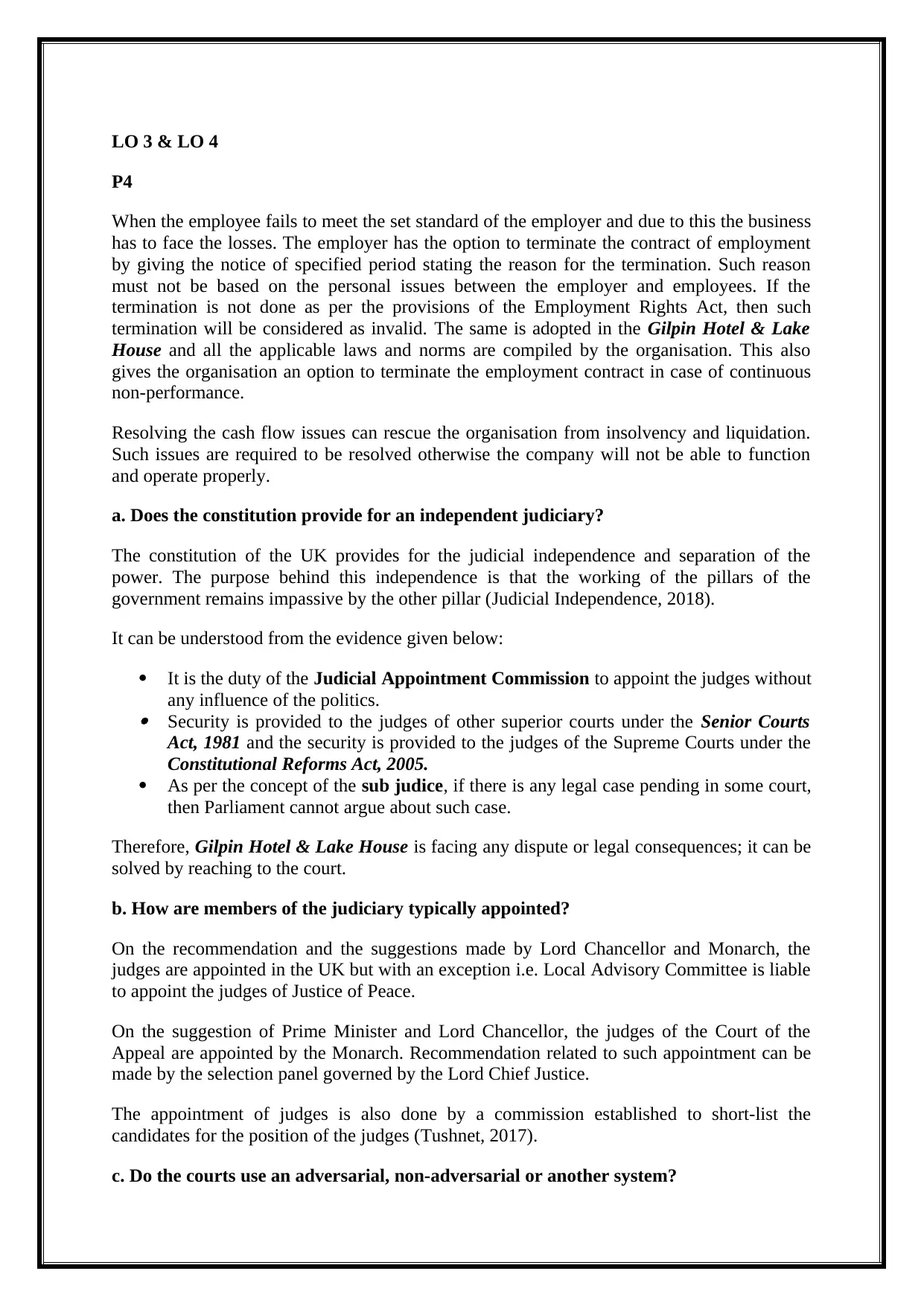
LO 3 & LO 4
P4
When the employee fails to meet the set standard of the employer and due to this the business
has to face the losses. The employer has the option to terminate the contract of employment
by giving the notice of specified period stating the reason for the termination. Such reason
must not be based on the personal issues between the employer and employees. If the
termination is not done as per the provisions of the Employment Rights Act, then such
termination will be considered as invalid. The same is adopted in the Gilpin Hotel & Lake
House and all the applicable laws and norms are compiled by the organisation. This also
gives the organisation an option to terminate the employment contract in case of continuous
non-performance.
Resolving the cash flow issues can rescue the organisation from insolvency and liquidation.
Such issues are required to be resolved otherwise the company will not be able to function
and operate properly.
a. Does the constitution provide for an independent judiciary?
The constitution of the UK provides for the judicial independence and separation of the
power. The purpose behind this independence is that the working of the pillars of the
government remains impassive by the other pillar (Judicial Independence, 2018).
It can be understood from the evidence given below:
It is the duty of the Judicial Appointment Commission to appoint the judges without
any influence of the politics.
Security is provided to the judges of other superior courts under the Senior Courts
Act, 1981 and the security is provided to the judges of the Supreme Courts under the
Constitutional Reforms Act, 2005.
As per the concept of the sub judice, if there is any legal case pending in some court,
then Parliament cannot argue about such case.
Therefore, Gilpin Hotel & Lake House is facing any dispute or legal consequences; it can be
solved by reaching to the court.
b. How are members of the judiciary typically appointed?
On the recommendation and the suggestions made by Lord Chancellor and Monarch, the
judges are appointed in the UK but with an exception i.e. Local Advisory Committee is liable
to appoint the judges of Justice of Peace.
On the suggestion of Prime Minister and Lord Chancellor, the judges of the Court of the
Appeal are appointed by the Monarch. Recommendation related to such appointment can be
made by the selection panel governed by the Lord Chief Justice.
The appointment of judges is also done by a commission established to short-list the
candidates for the position of the judges (Tushnet, 2017).
c. Do the courts use an adversarial, non-adversarial or another system?
P4
When the employee fails to meet the set standard of the employer and due to this the business
has to face the losses. The employer has the option to terminate the contract of employment
by giving the notice of specified period stating the reason for the termination. Such reason
must not be based on the personal issues between the employer and employees. If the
termination is not done as per the provisions of the Employment Rights Act, then such
termination will be considered as invalid. The same is adopted in the Gilpin Hotel & Lake
House and all the applicable laws and norms are compiled by the organisation. This also
gives the organisation an option to terminate the employment contract in case of continuous
non-performance.
Resolving the cash flow issues can rescue the organisation from insolvency and liquidation.
Such issues are required to be resolved otherwise the company will not be able to function
and operate properly.
a. Does the constitution provide for an independent judiciary?
The constitution of the UK provides for the judicial independence and separation of the
power. The purpose behind this independence is that the working of the pillars of the
government remains impassive by the other pillar (Judicial Independence, 2018).
It can be understood from the evidence given below:
It is the duty of the Judicial Appointment Commission to appoint the judges without
any influence of the politics.
Security is provided to the judges of other superior courts under the Senior Courts
Act, 1981 and the security is provided to the judges of the Supreme Courts under the
Constitutional Reforms Act, 2005.
As per the concept of the sub judice, if there is any legal case pending in some court,
then Parliament cannot argue about such case.
Therefore, Gilpin Hotel & Lake House is facing any dispute or legal consequences; it can be
solved by reaching to the court.
b. How are members of the judiciary typically appointed?
On the recommendation and the suggestions made by Lord Chancellor and Monarch, the
judges are appointed in the UK but with an exception i.e. Local Advisory Committee is liable
to appoint the judges of Justice of Peace.
On the suggestion of Prime Minister and Lord Chancellor, the judges of the Court of the
Appeal are appointed by the Monarch. Recommendation related to such appointment can be
made by the selection panel governed by the Lord Chief Justice.
The appointment of judges is also done by a commission established to short-list the
candidates for the position of the judges (Tushnet, 2017).
c. Do the courts use an adversarial, non-adversarial or another system?
⊘ This is a preview!⊘
Do you want full access?
Subscribe today to unlock all pages.

Trusted by 1+ million students worldwide
1 out of 21
Related Documents
Your All-in-One AI-Powered Toolkit for Academic Success.
+13062052269
info@desklib.com
Available 24*7 on WhatsApp / Email
![[object Object]](/_next/static/media/star-bottom.7253800d.svg)
Unlock your academic potential
Copyright © 2020–2026 A2Z Services. All Rights Reserved. Developed and managed by ZUCOL.




